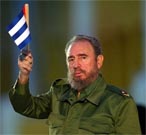Fidel Castro's voice still strong, even out of power
 Havana - A year after Fidel Castro announced his retirement, doubts persist as to how far removed the iconic Cuban leader really is from the decision-making progress in the communist island.
Havana - A year after Fidel Castro announced his retirement, doubts persist as to how far removed the iconic Cuban leader really is from the decision-making progress in the communist island.
Many Cubans continue to refer to him as "comandante," including his successor, Raul Castro, who admits to still consulting his older brother on all major issues.
In the early hours of February 19, 2008, a physically ailing Fidel Castro made public his decision to step down, refusing to be elected president again. He demoted himself from the rank of commander-in- chief, which he held for almost half a century, declaring himself only a "soldier of ideas."
Castro had "temporarily" stepped down from power in July 2006 to recover from an unspecified intestinal problem, and his move a year ago made official what was already widely expected. He has not attended public events since then, not even celebrations of the 50th anniversary of the Cuban Revolution on January 1.
But Fidel has not gone quietly.
Since 2006, Castro has penned some 100 "reflections," as he calls the articles that are regularly published in Cuban media.
As a "soldier of ideas," Castro, now 82, has been very active in his writing this year, while reducing his meetings with visiting foreign leaders.
Castro has expressed his opinion on matters of both international politics and domestic issues, and some observers believe he has revealed displeasure with at least some aspects of his brother's rule.
One example came after the European Union lifted political sanctions, imposed against Cuba after one of Havana's crackdowns on dissenters a few years before. Far from conciliatory in response to the European olive branch, Castro voiced "contempt" for EU policies and accused Brussels of "enormous hypocrisy."
He was ahead of the official response from Havana, which months later re-established political dialogue and cooperation with the EU anyway.
Yet the Havana leadership and Fidel himself have repeatedly denied the any struggle between the two brothers and emphasized "unity" within the government.
However, diverse voices from the Cuban internal opposition agree that there are differences within the government.
Raul Castro's wing pressed forward with changes in the first few months of his administration. There is also a "conservative" camp, led by Fidel and resistant to any kind of reform, which observers blame for the lack of further changes in recent months.
"(Fidel Castro) plays the role of trying, through his influence on government, to put a brake to, to neutralize, to distort this process with which Cuba is to move toward a certain international normalization," dissident Manuel Cuesta Morua told Deutsche Presse- Agentur dpa.
"He has tried to place obstacles in the path of that process, which is natural."
Fellow dissident Manuel Espinosa Chepe agreed.
"Fidel Castro continues to weigh heavily on Cuban government decisions; that is obvious," Espinosa Chepe said.
The dissident economist said that recent Fidel articles critical of new US President Barack Obama are "proof" of such a stance, after Raul Castro had spoken in favour of establishing dialogue with Washington.
"Right now, in relation to the United States, (Fidel Castro) is setting the pace, saying what needs to be done and even causing problems with the new administration," Espinosa Chepe said.
"This is a man who was for 50 years the father of this process, and he has conceptions and opinions. It is difficult for him to leave national life, even if he says he will."
However, Fidel himself has recently denied clinging to power.
In late January - in an article published after weeks of absence from the media prompted renewed rumours about his health - Castro said that he had reduced the number of his "reflections" so as not to interfere with Communist Party comrades and the state "in the constant decisions they have to make." (dpa)